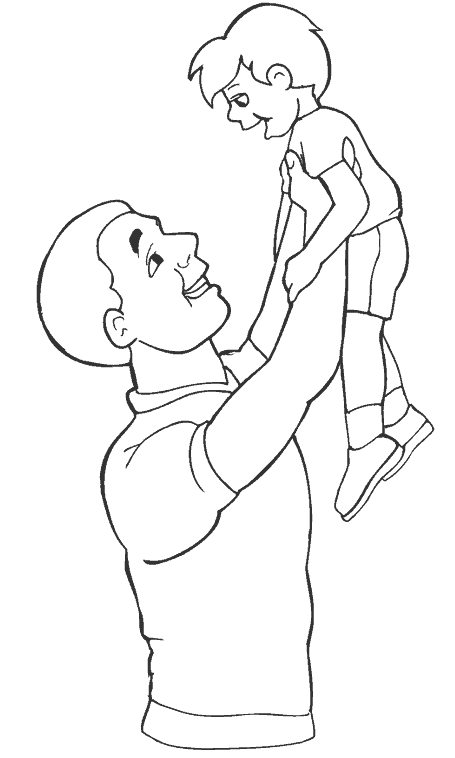Being a Good Dad
Being a good father is a full-time job. Learning how to be agood fatherinvolves more than just providing for your child’s materialneeds, though that’s an important aspect of fathering children. You alsohave a responsibility to help in their social, psychological, and emotionaldevelopment.
One thing many parents don’t absorb, though they might know thisrationally, is that your child is learning every moment of the day. Beinga good father is in many ways about being a good teacher. The onlyproblem is, your kids learn from every single thing they hear you say andevery single thing they watch you do. So while you have to be a teacher toraise a child the proper way, it also helps to be a good person, becausethey learn more from the example you set than the words you use to instructthem.

Withthat in mind, here’s some tips for how to be a good father. I want todiscuss two things every father should do, regardless of consequences.Showing respect to their mother and providing for their needs should gowithout saying, but too many fathers don’t learn that lesson. Once that’sout of the way, I’ll discuss how to be a good father through education,discipline, and building bonds that will last a lifetime.
Respect the Child’s Mother
Another way to teach by example is to always show respect to theirmother when in the child’s presence. That tip applies whether you andthe mother are still married, never married, separated, or divorced.Whatever issues you’re having and whatever has gone on in the past, showingrespect to your wife or ex-wife gives them a frame of reference for theirbehavior–not just for her but for women in general.
If the two of you behave like spoiled children or vengeance-mindedex-lovers, you are making yourself and each other look bad in front of yourkids. They’re going to get stressed and may have lingering psychologicalscars from these displays. It’s far better to hold your tongue and hash outyour problems behind closed doors. If you can’t say anything positive toyour wife or ex, then say nothing at all.

This tip applies even if she disrespects you. Defend any charges calmlyand respectfully, but treat this person with respect. At the very least, youcan set an example. Your child is still going to get agitated, but they’llalso see how to deal with rude people. When you ask your child to takesides, you’re going to make their childhood unpleasant, and they’lleventually resent you for it. When they get older, even if their mother’sbehavior colors their attitudes to you right now, they’ll come to realizewho the reasonable one was. If your ex-spouse can’t behave better than that,your kids will eventually figure out she’s not a particularly good example.If she a big influence in their lives, at least they have one positiveexample (you) to learn from.
Provide for Their Needs
No matter what happens, always provide for your kids’ needs. Youbrought them into this world and you owe them that much. I’m talking aboutmaterial needs, but they also need to know you’re their for the emotional,psychological, and social needs. Try to be there when they have traumaticevents or trouble at school. Try to attend social functions (like ball gamesand recitals) where other kids’ parents are attending. Make sure your childhas all their various needs met.
Spend Time with Your Children
Children are like sponges; they soak up everything around them. If you’relike me, you wonder how children have so much energy. Besides having achild’s frenetic metabolism, there’s the fact that everything is new to achild. Every thing they do is a point for observation and analysis. That’sone of the reasons kids come up with such wonderful, one-of-a-kindsayings–they bring a fresh perspective to life. They’re learning about theworld. They have a want and a need to absorb information.

The most important thing you can do is to spend time with yourchildren. If you want your child to be like you and share your values,spending valuable time with them in their early years is the best way to dothat. If they aren’t learning from you, they’ll be learning from somebody orsomething. If you aren’t around, they’ll learn from their mother, theirsiblings, their classmates, their neighbors, or perhaps the television andthe Internet. Spending time with your kids means they learn from you, andyou can give them perspective from what they learn from others.
The more time you spend with your sons and daughters, the moreenriched your life is going to be. You’ll find yourself enjoying theircompany, delighting in the fresh outlook they bring to your day, and bondingwith them in ways you’ve never bonded with another person. If you’rewandering around the world hoping to build special relationships like youfind in books and movies, spend time with your child. It will be the mostimportant investment you’ll ever make. That’s what life is about.
As for your child, having their father around means they’ll develop abond with you and with strong males in their life, they’ll learn a respectfor authority figures, and they’ll develop a sense of security andself-worth they might not develop otherwise.
Be a Teacher
While you’re spending time with the kids, try to be a teacher for them.Reading to them (especially) and helping them with homework is important,but you want to teach them in the grand sense of the word. Encourage yourchildren to be inquisitive and explore their talents and interests. Exposethem to a well-rounded set of experiences, settings, and information. Takethem to the zoo, the library, and the museum from time to time. Watch moviesand tv shows with them, but also expose them to books and art. Encouragethem to learn a musical instrument or go out for a sport.
Many parents have an expectation for their child, to become a starathlete or a brilliant student or a master musician, often to fulfillsomething the parent felt was missing from their life or childhood. Forcinga child into one pursuit probably isn’t going to make it happen, if theydon’t have amazing natural talent. But if you expose your child to apanoramic range of possibilities, they have a greater chance of findingsomething they absolutely love and are brilliant at. There’s no telling howmany brilliant musicians and scientists we’ve missed out on, simply becausethat person wasn’t exposed to the right stimulus as a child. Even if yourchild never finds a natural genius at some pastime or field of learning, theidea is you have a well-rounded child in the end.
Don’t Place Expectations
This goes hand-in-hand with the last suggestion, but don’t placeunnatural and unwarranted expectations on your child. Don’t make theirbaseball game seem like it’s a matter of life or death. Don’t make thosepiano lessons the absolute crux of the week. Henry Ford said that genius is”the capacity for hard work”, and men like Einstein and Mozart said more orless the same thing. If your child is going to be a genius at music orsports, that talent is going to come from a true love of what he or she isdoing. You won’t have to push them and prod them into pursuing it. Exposethem to a lot of different options, then sit back and see where they takeit. Relax and enjoy your children for what they are, and you’ll bedisappointed less.
Don’t Say One Thing and Do Another
Don’t say all the right things, but behave another way. I know acouple who pushed their kids into select soccer. Though they talked a goodgame about schoolwork and getting a good education, getting their kids tosoccer practices, games, and tournaments seemed to fill up their lives. Whenthe parents got really excited about an accomplishment, it was about socceraccomplishments. When the parents got really upset about something, it wasusually about something that happened on the soccer field.
They said all the right things, but their actions sent a differentmessage to their kids. Soccer seemed to be the most important thing in theworld, while school seemed secondary. As the years passed and the kids gotolder, they seemed to focus more on their soccer skills than their grades.As their grades slipped and the parents poured thousands of dollars eachyear into league fees and trips overseas for tournaments, those kids collegefuture seemed to resolve around a soccer scholarship. But when theyear-round wear-and-tear of two leagues and countless tournaments causedinjuries to pile up, the scholarship option wasn’t there, either. Besides,education wasn’t their strong suit anyway. And with all their expectationson sports, the kids came to resent their parents’ focus on a silly game.
You see the danger here. Saying one thing isn’t enough. Seeing yourpriorities sends a strong and clear message to your kid. They often start tohave the same priorities, whether that’s what you really want or not. And ifthose priorities are unreasonable or frivolous, they may eventually resentyou for it. Your child is eventually going to be old enough to questionevery action you took, so you need to behave yourself along the way.
Show Affection
That reminds me. While all of this is going on, be sure to heap tonsof affection on your kids. Not only does this build self-esteem andproper emotions in a child, but it also teaches them how to show affectionto other people. Your kids need to know you love them at all times, nomatter what happens in the world. You might be gone tomorrow, so makecertain your child knows you love them today. They’ll always take that withthem.
Establish Discipline
It can’t all be about affection and freedom of choice, though. You’rethe father, so you’re going to have to establish discipline in your child’slife. Your sons and daughters need a sense of bounds, “bounds” meaningthey need to be taught when they’ve gone too far. Once your childunderstands that boundaries of good and bad conduct, they’ll be able tointeract with other people in the world–to “make friends and influencepeople”, as they used to say in the old days.
I won’t tell you whether you should establish discipline through physicaldiscipline, but I will say that the basis of discipline involves teachingyour child consequences. Your child has to understand early on thatthey’ll be rewarded for good behavior and punished for bad behavior. Thisteaches them the concept of consequences, when debating and trying to reasonthem only teaches a child they can “lawyer” situations to their advantage. Ayoung child doesn’t understand the finer points of logic, so the signalsyou’re trying to send are getting mixed up.
Be Consistent
When establishing proper discipline, never be mean or vindictive toyour child. You are teaching them that every action has a consequence,but lessons are learned only if they are consistently taught and retaught.If you lose your temper and sometimes go too far, you’re teaching them thatanger and over-reaction are proper. Ultimately, over-disciplining andhumiliating your child is going to harm their self-esteem and (as they getolder) make them lose respect for you.
No Motivation by Intimidation
Firm, yet tempered, discipline is a valuable lesson in itself. Expertstell you that it’s better to tell a child quietly that the child hasdisappointed you than it is to yell at them, and that’s true. But what yousay to your child in these moments is important. As mentioned before, thechild has to be taught consequences for their bad behavior, so if your pointis to talk quietly and reason with them like they’re an adult, then you’remissing the point. You have to set rules and punishments in order to set upa system of consequences and create boundaries. When all is said and done,they have to understand you are in charge and it’s in their best interest tolisten. Your child has to understand that behaving is going to get a child alot further in life, while misbehaving leads to difficulties. Your son ordaughter will eventually learn the lesson, if you consistently apply thatprinciple to your instruction of them.
It’s a bad idea to indulge your child in their bad behavior.Either you train a child or the child trains you. If you decide upon amethod of discipline, but decide not to enforce the rules because it’s toomuch trouble, you’re sending a clear message to the child: it’s okay tobehave in a horrible fashion. Instead of you disciplining them and educatingthem on how to behave properly, they’ve trained you to accept they are goingto misbehave. They’ve won the test of wills with you, but this is a badlesson for the child to learn, because most people aren’t going to indulgetheir ugly behavior the way you will. In the end, your child is likely to bedisliked by most people they meet, because they never learned the benefitsof good behavior.
Listen to Your Kids
While you are disciplining your child, you want to always listen to whatthey say. Teach your child that it’s all right to ask Dad questions.Kids ask a lot of questions and, if you answer these questions patiently andattentively, you’re encouraging them to be inquisitive and askquestions–not just to accept the little bit they know about the world.
Listening to a child also gives you a real insight into their world.I have a friend whose daughter often complains that she’s scared when shegoes to bed at night and from their interaction you get the idea that (whencompany isn’t there) he personally makes sure she feels secure. She’s twentyfeet away from mother and father most of the time she’s scared, but kidshave irrational fears. Being patient with your child and reassuring themsends the message that you’re there for them and everything is alright,while ignoring their irrational fears sends the message that you’reunavailable. It might seem like a small matter now, but if that message islearned at an early age, they might not be as likely to come to you withreal concerns when they get older and the dangers become real.
Be Patient
It’s easy to lose your patience with a child. You already learned thelessons they’re learning a long time ago. Like I mentioned before, much ofwhat children think and fear and say can be dismissed as irrational or”child’s stuff”, especially if you have your mind on other things or lifehas gotten hectic. But if you’re patient with your child, you’ll do agreat deal to teaching them about maintaining their patience, whilereassuring them they are important and what they have to say is important.This helps form a strong identity and sense of self-worth. I mentionedearlier that they learn from your example, and maintaining your patience isa good way to teach by example.
Have Fun
Revel in the unique relationship you have with your children. Have funwith them and they’ll want to spend more time with you and less time withthe less positive role models and peers in their lives. Enjoy your childrens’childhoods, because it goes by way too fast. Before you know it, they’ll bemoving out and moving on to other things. Hopefully, you’ll have a strongrelationship and many decades of friendship. But when they’re grown, theonly thing you’re sure to have are those memories. So spend as much timewith them when you can, take lots of photos, and have fun with your kids.






